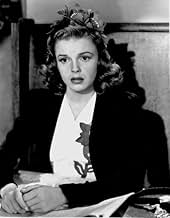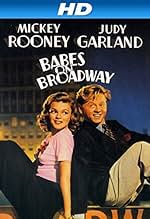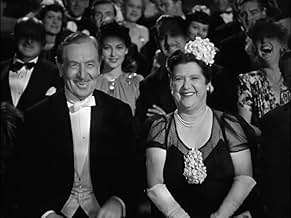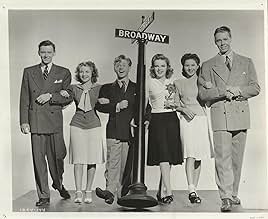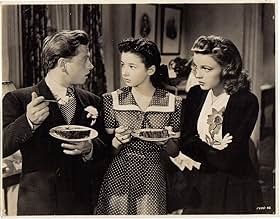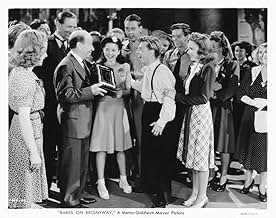Ajouter une intrigue dans votre languePenny Morris and Tommy Williams are both starstruck young teens but nobody seems to give them any chance to perform. Instead, they decide to put up their own show to collect money for a summ... Tout lirePenny Morris and Tommy Williams are both starstruck young teens but nobody seems to give them any chance to perform. Instead, they decide to put up their own show to collect money for a summer camp for the kids.Penny Morris and Tommy Williams are both starstruck young teens but nobody seems to give them any chance to perform. Instead, they decide to put up their own show to collect money for a summer camp for the kids.
- Réalisation
- Scénario
- Casting principal
- Nommé pour 1 Oscar
- 1 nomination au total
- Man
- (scènes coupées)
- Elinor Downing, War Refugee
- (non crédité)
- Butch
- (non crédité)
- Mrs. Crainen, the Matron
- (non crédité)
Avis à la une
Mickey is a member of a trio which also consists of Ray McDonald and Richard Quine singing for their supper at a one armed spaghetti joint owned by Luis Alberni. One of the three customers in the joint one night is Broadway girl Friday, Fay Bainter who loves the act and Mickey especially. She spends the rest of the film trying to get ulcer ridden producer James Gleason to hear him and the rest of the talent Rooney collects for that inevitable show he wants to put on.
Of course one of those talents is Judy Garland, another eager young hopeful and the musical highlight of the film is their singing the famous Vernon Duke song, How About You. It's not one of Berkeley's big production numbers, it's done with Mickey and Judy at a piano in her place, but their infectious enthusiasm will grab you immediately. How About You was later done in the fifties with a really fine arrangement by Rosemary Clooney and Bing Crosby in one of their joint albums.
The other highlight for me is the surreal number done when Judy and Mickey arrive at a long closed theater for their show and are transformed by the spirits of the performers of long ago who headlined in the place. What has to be remembered is that several of these people were actually still alive when Mickey and Judy are imitating them, people like George M. Cohan, Harry Lauder, Blanche Ring. Faye Templeton, Sarah Bernhardt, and Richard Mansfield were long dead or retired by then. Still people in the audience remembered them and Mickey and Judy's reverential treatment to these stage stars of long ago must have struck a chord in movie audiences we can't appreciate today.
The minstrel show finale of course isn't good, yet even that is salvaged somewhat by Judy's singing of Franklin D. Roosevelt Jones. She also recorded it for Decca and the number still plays well today. When Judy does it even in blackface, somehow instead of degrading, it comes out as a tribute, like Fred Astaire in blackface imitating Bill Robinson in Bojangles of Harlem.
My favorite of their joint projects has always been Girl Crazy, still Mickey and Judy are as alive and fresh in Babes on Broadway as ever and it's a great example of matchless chemistry and teamwork.
'Babes on Broadway' is my least favourite of their musicals ('Babes in Arms' had its problems but was a little better as an overall film regardless of its bowdlerised treatment of the musical), but Garland and Rooney and their chemistry are what saves the film. It works well as a musical, but fares problematically as an overall film, one can totally see the appeal but there are definitely understandable reasons as to why it won't click with others.
The story is very contrived and the sentimentality and corniness went well overboard in places. Was willing to forgive that it was structurally thin, the contrivances and problematic tone less so. There is some wartime patriotism which feels both out of place (tonally it feels odd with the rest of the film) and heavy-handed, and some of the editing is on the bloated side, some of it not serving much relevance to the story.
Unsurprisingly, the biggest criticism that 'Babes on Broadway' has gotten is regarding the "black-face" finale. Some of the criticism here has been over-the-top and I have seen plenty of classic period musicals to know that black-face routines were common at the time (it's very like being familiar with racial stereotypes in cartoons), still doesn't stop me not particularly caring for them. Wasn't offended as such here, but the finale did come over as overblown, rather tasteless and it has aged badly (even when judging it by 1941 standards and not by 2017 standards).
However, even when not in Technicolor, 'Babes on Broadway' still looks lovely in crisp black and white and with elegant production design. As said, on the musical front (production values, songs, vocal performance, arrangements, choreography and dancing) 'Babes on Broadway' fares significantly better. The songs are very pleasant and lively, "How Are You", "By the Light of the Silvery Moon" and "Hoe Down" faring best, "Chin Up, Cheerio" is enthusiastically performed but a bit patronising. The choreography mostly has energy and tenderness, really appreciated "Hoe Down's" intricacy.
Of the humour, Rooney's hilarious and pretty amazing impression of Carmen Miranda is a big standout. Garland does well too with her imitation of Sarah Bernhardt. Some nice fun wit and charm in the script, and Berkeley directs more than competently. 'Babes on Broadway' more often than not has a lot of energy and charm.
Fay Bainter, James Gleason and Donald Meek are very good in their roles (then again they could phone in a performance and still be good), and Margaret O'Brien is adorable in a short pre-fame appearance. Ray McDonald's dancing is pretty incredible. At the end of the day though it is Rooney and Garland that make 'Babes on Broadway' worth watching. Rooney clearly has fun, even if he does overdo it at times, while Garland, on radiant and touching form, is even better. Their chemistry is wonderful.
Overall, uneven film but Rooney and Garland delight hugely. 6/10 Bethany Cox
Le saviez-vous
- AnecdotesVincente Minnelli conceived and supervised the "Ghost Theater" sequence where Garland and Rooney imitate theatrical notables of the past.
- GaffesWhen Alexander Woollcott is introducing the story, at one point his bow tie disappears and his collar is open.
- Citations
Maxine, Little Girl at Audition: Please wait, don't send my brother to the chair, don't let him burn, please, please warden, please.
- Versions alternativesSome older television prints of the film delete the minstrel show finale.
- ConnexionsEdited into Hollywood: The Dream Factory (1972)
- Bandes originalesBabes on Broadway
(uncredited)
Music by Burton Lane
Lyrics by E.Y. Harburg
Played and sung by a chorus during the opening credits
Reprised as a production number with the principal cast near the end
Sung and danced to by Judy Garland and Mickey Rooney in blackface
Danced to by Ray McDonald in blackface
Meilleurs choix
- How long is Babes on Broadway?Alimenté par Alexa
Détails
Box-office
- Budget
- 940 068 $US (estimé)
- Durée1 heure 58 minutes
- Couleur
- Rapport de forme
- 1.37 : 1
Contribuer à cette page



